Project Euler problem 14:
The following iterative sequence is defined for the set of positive integers:
n → n/2 (n is even) n → 3n + 1 (n is odd)
Using the rule above and starting with 13, we generate the following sequence: 13 → 40 → 20 → 10 → 5 → 16 → 8 → 4 → 2 → 1
It can be seen that this sequence (starting at 13 and finishing at 1) contains 10 terms. Although it has not been proved yet (Collatz Problem), it is thought that all starting numbers finish at 1.
Which starting number, under one million, produces the longest chain?
My first instinct is to create a function to calculate the chains, and run it with every number between 1 and 1 million. Obviously, that takes a long time. Way longer than solving this should take, according to Project Euler's "About" page. I've found several problems on Project Euler that involve large groups of numbers that a program running for hours didn't finish. Clearly, I'm doing something wrong.
How can I handle large groups of numbers quickly?
What am I missing here?
